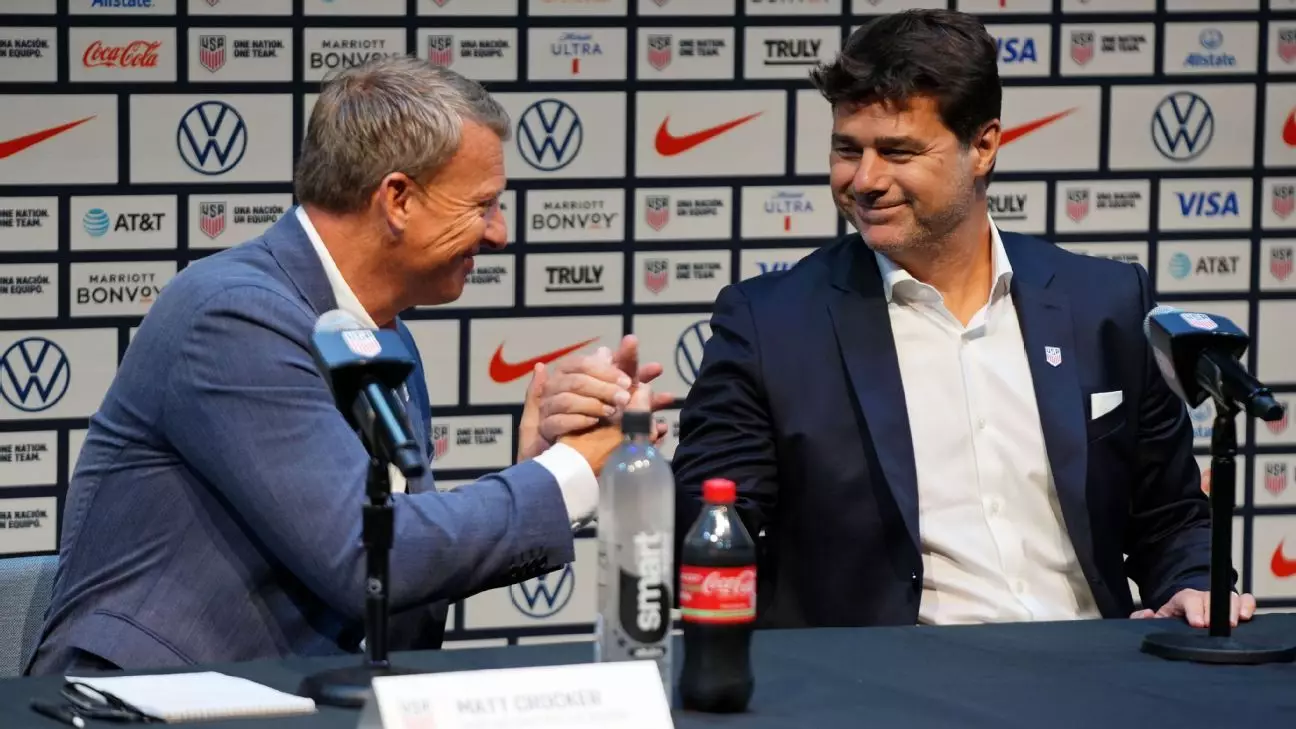Mauricio Pochettino’s appointment as the head coach of the U.S. men’s national soccer team symbolizes not just a change in leadership but a potential watershed moment for American soccer. On his first day, Pochettino underscored the ambitious nature of his vision by pointing out the success of the U.S. women’s team, a powerhouse that has garnered unparalleled achievements in soccer. “We are here because we want to win,” he proclaimed, setting the tone for his tenure—one that is clearly focused on achievement.
Despite the glaring disparity in accomplishments between the men’s and women’s teams, Pochettino’s intent to cultivate a winning mentality among his players is commendable. Historically, the U.S. men have yet to enjoy the same level of success, having last reached the World Cup quarterfinals in 2002 and yet to claim a World Cup title. The women’s record of four World Cups and five Olympic gold medals serves as an inspiring benchmark. Pochettino’s mission appears twofold: to elevate the team’s performance on the international stage and to imbue a strong belief that a World Cup victory is not just a dream but an attainable goal.
At 52 years of age, Pochettino’s journey as a coach has taken him through several prominent clubs in Europe. His wealth of experience includes notable stints at Tottenham Hotspur and Paris Saint-Germain, where he earned accolades, including a Ligue 1 title. Yet, his new role as the U.S. national team coach marks his debut in leading a national squad and paves the way for an intriguing chapter in both his career and the team’s history.
Taking over from Gregg Berhalter, who was dismissed after a disappointing Copa América campaign, Pochettino is now the 10th head coach of the U.S. in just 14 years. The frequent coaching changes have troubled the team’s development and consistency, but Pochettino brings a fresh perspective and a clear philosophy about collective play and teamwork—qualities he emphasized during his introductory press conference. He stated that it is vital to mold the team into a cohesive unit capable of executing strategies that can overcome opponents, particularly pivotal as the World Cup approaches.
While acknowledging the current team as a “very good generation of players,” Pochettino’s reservations highlight the importance of unity over individual talent. Many pundits have touted this crop of players as among the most talented in U.S. history, but Pochettino insists that the on-field product must reflect a cohesive organization. His emphasis on collective synergy indicates a shift from highlighting individual strengths to fostering team dynamics, which has often been a stumbling block for the U.S. men’s team during critical matches.
Pochettino’s early engagements, such as his dinner with American soccer stakeholders, signal his intent to immerse himself in the American soccer culture, understanding the nuances and expectations as he charts a course for international competition. His first games—a series of friendlies against Panama and Mexico—are crucial as they represent the initial stepping stones in building rapport among players and implementing his strategy.
As he prepares for the upcoming World Cup in 2026, Pochettino faces several obstacles. The U.S. team’s vulnerabilities, particularly in goalkeeper and central defense, pose a significant challenge that he must address quickly. Additionally, issues regarding maintaining discipline on the pitch have plagued the team historically, and establishing a culture of accountability and resilience will be imperative to achieve success.
In the limited time available before the World Cup—637 days to be precise—Pochettino needs to optimize training sessions and performance reviews. Only eight one-week training periods before competitive matches can hinder systematic progress, making his initial weeks critical for establishing foundational tactics.
Mauricio Pochettino’s appointment heralds a significant turning point for U.S. men’s soccer. His vision resembles a rallying call: to not only strive for excellence but to embody a relentless pursuit of victory. By urging his players to aspire toward the heights reached by their female counterparts, Pochettino sets forth an ambitious agenda for a team that has long yearned for historic success on the world stage. It remains to be seen whether he can lead the U.S. men to heights previously thought unattainable, but the journey towards crafting a competitive legacy begins now.

